- Home
- David Levithan
Wide Awake Page 14
Wide Awake Read online
Page 14
“It has been, as you can imagine, a long, long night for many of us. The governor of this state would prefer that we not be here. He would like us to pack and go home, so he can try to steal this election without any scrutiny. Members of the opposition party have told me to let the process take its course. If I don’t like the results, they say, I can always sue. Well, I have to tell you: As far as I’m concerned, this is part of the process. I am not going to wait, I am not going to rely on others to make my case, and I am not going to silence my own voice or the collective voice of the people who voted for me. I am not going to shut my eyes and hope it goes away. There have been popularly elected Presidents who came before me who did not take to the streets when their elections were challenged…and these Presidents always lost the Presidency they deserved. I will not make that same mistake. I owe it to my voters, to my country, to our democracy, and to my faith in justice to actively and forcefully defeat any efforts that seek to undermine the results of this election and the will of the people. I will be here for as long as that takes…and I thank you for joining me.”
Stein would return to the stage once an hour, every hour, until the governor of Kansas backed down. In between his appearances, various other politicians and entertainers came onstage to rally us on. First up was a folksinger from the ’90s—a favorite of Mira and Keisha’s—who came armed with little more than her voice, a guitar, and some carefully chosen words. The song she sang was one I’d always thought of as a breakup song. But now I realized it was a protest song as well.
The houses have been condemned on Memory Lane
I’m tired of this struggle that leaves everything the same
I’ve tried so hard to make it work
that I’m dying inside
Well, you can take my past
But you can’t have my tomorrow
Promises that remain promises are useless and they’re cheap
I wish I could put a price on words so I could make them keep
I put so much faith in you
I lost all my faith in me
Well, you can take my past
But you can’t have my tomorrow
I’m giving up on giving up
I can’t leave it all to prayer
’Cause the first step in getting better
is knowing what’s not there
You said you’d make it better
and that just makes it worse
Well, you can take my past
But you can’t have my tomorrow
Yes, I want my life to last
So you can’t have my tomorrow
No, you can’t have my tomorrow
Jimmy and I lay listening from our sleeping bags. Then, when the folksinger was through, I unclasped his hand so we could both applaud.
We were ready now to jump back into the world.
twenty-two
Janna and Mandy’s present was blueberry pancakes. This in itself would have been sweet, but even sweeter was the collective effort that went into making them. Since all of the nearby grocery stores had been pretty much cleaned out, Janna and Mandy didn’t just make the pancakes from scratch; they also had to dredge up the ingredients from scratch. All they had, at first, were the blueberries, which Janna had packed from home, knowing they were Jimmy’s favorite. So they started talking to our neighbors. Janna and Mandy and Sue and Elwood and Flora and Keisha and Mira moved from blanket to blanket, tent to tent, finding flour in one spot, eggs in another, cooking oil in a third. The pug owners behind us had brought along an electric griddle, which they let Elwood borrow. In return, we gave away some of our Everything Bars—but mostly people didn’t ask for anything in return. They were happy to help out with a birthday present.
Jimmy enjoyed it thoroughly.
The only members of our group who didn’t join us for breakfast were Gus and Glen, who remained in their tent even as the rest of the rally bustled to life. I imagined the best (while taking care not to imagine too specifically)…but when Gus finally emerged, it wasn’t sparks I was seeing. Instead of looking peachy, he looked like the pits.
“Uh-oh,” I murmured to Jimmy.
“Oh, not again,” he murmured back.
As Glen came out of the tent and made his way to his brothers, Gus trudged over to us.
“What happened?” I asked.
“Oh, it’s just so everything,” Gus replied with a sigh. “I mean, he’s super hot and he has good teeth, but when we were just us, you know, he didn’t really play the hits. The oomph and aahhh were height-worthy, but the chatter was mucho ungood. I mean, he said he loved how surface I was, and I know it was meant as a compliment, but I don’t know if that was the right compliment to shoot me. Plus plus plus we totally couldn’t sleep right—parts of us kept falling asleep before the rest of us did, you know? I just don’t think it’s going to work.”
“Another soul mate bites the dust,” Jimmy said.
“So much for love,” Gus agreed. “So much for moon-star-sun-aligning knock-your-socks-off-through-your-shoes I’m-so-lucky-I-found-you kismet kissing-grinding love love love. Now, where are the pancakes?”
Somehow I knew Gus was going to be okay.
Glen, too, looked like he was going to be all right. Until I realized that the brother coming over to talk to Virgil wasn’t Glen. It was Gary. Or maybe Ross.
“We should probably head home,” he said. “But we wanted to thank you for giving us a ride.”
Virgil shot a chastening look Gus’s way. (Gus, forking pancakes onto his plate, didn’t notice.)
“You don’t need to let hinky-jinky get in the way of your protest,” Virgil told Gary (or Ross).
“No, sir. It’s just that my brother has a match he has to get back for, and we didn’t really plan to be here this long. I think the crowd is big enough that the three of us won’t be missed.”
I couldn’t figure out if the “won’t be missed” was directed at Gus or not. Gary/Ross didn’t sound too bitter; if anything, he sounded genuinely thankful for the ride and the company.
As we watched the triplets leave, Gus looked particularly bummed. But I think the rest of us were a little bummed, too—this was the first departure from our group, and it meant that other departures were also possible.
Gus came over and we all sat together at the center of our makeshift campsite. Hundreds of names scrolled across the screens each minute—the names of all the people who were with us even though they couldn’t be with us, who had texted in to add weight to what we were doing. In the background, politicians tried to rouse us with their oratory, and musicians tried to engage us with their songs. We were focused, for the moment, on smaller things, like our lives.
“That’s the problem with triplets,” Gus said between bites. “You always wonder whether you went with the right one.”
“Oh, that’s not just with triplets,” Jimmy chimed in.
I put down my fork. “What’s that supposed to mean?” I asked, trying to play at making it sound playful.
“Nothing. I wasn’t talking about us,” Jimmy assured me. “And anyway—it’s my birthday. You’re not allowed to be angry with me.”
“Maybe you’ve mistaken me for one of my identical twins,” I said.
“Nah. I’d know you with my eyes closed.”
Gus was starting to squirm. “Hey now, hey now,” he said. “We’re in a no-bickering zone, comprende?”
“We’re not bickering,” Jimmy and I said at the same time.
“Well, as long as the two of you agree on that…”
Jimmy thanked everyone for the effort behind the pancakes. We cleared off the plates, returned what needed to be returned, and then…sat. And listened. And waited. As promised, Stein came and spoke every hour on the hour. There wasn’t much new to report—more election officials were coming out against the governor, but he was standing firm. Almost two million people were now in Topeka, but nobody knew what that would really mean. We were prepared to stay, but we weren’t entirely prepare
d to have nothing to do but cheer and applaud and dig in our heels.
Jimmy surprised me by being the one to ask Virgil about this.
“Don’t get me wrong—I’m all for being a part of this,” he prefaced. “But, Virgil, I’m just wondering what good it does to have us here. I mean, the governor of Kansas isn’t going to back down just because we’re in his town, right? We can’t really change his mind, can we? Or intimidate him. So why, really, are we going to stay here?”
Mrs. Everett clucked her tongue a little, but Virgil was game to answer.
“All those people who are coming forward with information about the governor,” he said, “where do you think they’re finding the strength to come forward? Our man Stein—what do you think is giving him the strength to fight this instead of sending in all the lawyers? All the people who are at the state capitols—why do you think they’re staying put? It’s because of us. Every single one of us. As one great mass, we’re doing something presidents and kings and queens and governors and mayors and teachers and parents are all supposed to do: We’re leading by example. I agree that the governor is probably too stubborn a man to back down just because we’re here. But it’s because we’re here that the right things are going to happen. It’s because we’re here that injustice will not win. Because they know we’re watching. They know we won’t just go along with whatever they try to do to us. They weren’t expecting a fight, but by golly they’ve gotten a fight. And in that case, there’s strength in numbers, and a lot of that strength comes from the numbers. We lead by example, the truth’s gonna follow. Just watch. If we leave, then they think they’ve won, and that means they think they can keep doing whatever they can to win. We’re not gonna let them think that. Because, thank goodness, it just ain’t true. We get up, stand up for our rights. We won’t give up the fight.”
As soon as he finished, a roar began to spread through the crowd. Green banners were held aloft and flown. Teenagers jumped up and down. I thought I even saw one girl cry.
Much to my horror, Holy Ghostwriter was taking the stage.
twenty-three
All revolutions have to have music. It’s rarely noted in the documents and organizations that follow—the Declaration of Independence doesn’t have a tune; the United Nations doesn’t have a theme song.
And the music is never really what you’d expect. Take, for instance, the flute. Who would ever expect revolution to come out of a flute? But right there next to the little drummer boys and girls, you’ll usually find a flute larking like the voice of better times, of innocence made to suffer for the greater good.
Or the trumpet, which can be so full of mourning and jazz, rouses itself into a Glory, Glory, Hallelujah! with one great blast of breath.
Holy Ghostwriter didn’t have any flutes or trumpets. In fact, there were many people (myself and Jimmy included) who doubted its members played any instruments at all. But still, the minute Abraham Stein said their name, they received an orchestral response.
“We’re here,” Apostle, the lead singer, said, “because we believe that good must triumph over evil. Even though Stein is not of our faith, he is still a man of faith, and we have faith in that. I’ve been up all night writing this song for you. It’s not much, but I hope it sums up why we’re all here, and the nation we want to see. It’s called ‘4 the Future.’” (We knew it was 4 and not for because Apostle held up four fingers as he said the word.)
Apostle nodded, and suddenly there was a blast of sound as harmonic as it was loud—a euphony of synthesizer and string. Apostle nodded as it amplified over us, stretching his arms out wide. Then he returned the microphone to his lips and began to sing his anthem for us.
U R 4 Me
And I M 4 U
That is what
He’d want us 2 do
Love 1 another
It’s what we’re here 4
2 True 2 B 4-gotten
He does not ask 4 more
U R 4 Me
And I M 4 U
Brothers and sisters
We’ll see this thru…
By the third time Apostle repeated it, everyone was singing along. I felt absolutely ridiculous, but when Janna reached for my hand and everyone else started to hold hands and sing out the words, I couldn’t deny what was happening. And the word I thought was united. How powerful it was to be in a country whose adjective was united. How strong to be in a moment where everyone felt united.
Janna and Mandy looked rapturous with every chord, while Jimmy (on the other side of me) looked like he was about to rupture from holding his laughter in.
I leaned into him and said, “Hey, you could take it a little more seriously.”
“I love it.”
“Well, then, I have a confession to make.”
His eyebrow raised. “Yes?”
“This is your birthday present.”
“Holy Ghostwriter?”
“Yes. You would not believe the things I had to do in order to get them here to sing for you—or, should I say, 4 U—on your birthday.”
“What did you have to do?”
“I can’t tell you everything. But prostitution was definitely involved.”
“You slept with the members of Holy Ghostwriter?”
“The members and their members. Yes.”
“Even Apostle?”
“Apostle twice. But one of them was for free, so that doesn’t really count.”
“U really do love me, don’t U?”
“U R the 1 I’m living 4.”
“U R 2 good 2 me.”
“4 sure.”
At this point, Janna yanked me away from Jimmy and told me to shush—Holy Ghostwriter was about to perform her favorite ballad, “1 + 1 is 3” (“1 + 1 is 3 / Because there’s no love the Lord can’t C / I’ll gladly B / a part of your Trinity / Together U ’n’ me / will make 1 + 1 into 3”).
I let go of Janna’s hand, Jimmy let go of Gus’s, and we kissed like schoolgirls.
“You guys,” Janna muttered.
Jimmy and I watched as Holy Ghostwriter continued to perform. Some screens were still showing the names of all the people supporting us from afar. Others showed the concert, and every now and then they’d pan across the crowd, showing all the faces underneath the green banners. Usually I couldn’t care less about crowd shots, but this time was different, because I felt a connection to each and every face they showed.
Then the camera showed an attractive woman with night-black hair, inch-long eyelashes, and near-perfect cheekbones.
“That’s my father!” Sue cried out. “That’s my daddy!”
twenty-four
Like a shot, Sue was picking up his things and heading off to find his father. We tried to figure out which part of the park he was standing in, but there weren’t very many clues, and the camera cut away from him after a few more seconds.
“He must be near the front,” Keisha volunteered.
“Probably near the stage, since most of the cameras are up there,” Mira agreed.
Some of us volunteered to go with him. But Sue said no, he wanted to do this alone. He took our numbers so he could call if he got lost. And then, as we showered him with encouraging words, he was gone.
“Kin always gravitates toward kin,” Mrs. Everett observed.
“Do you have any kin here?” Flora asked sweetly.
“Why, no,” Mrs. Everett replied, just as sweetly. “I consider y’all my kin.”
Virgil just sighed and started humming the “U R 4 Me” song.
It wasn’t long after Holy Ghostwriter exited the stage that Sara reappeared.
With everything that had happened, I’d almost forgotten about her. But neither Keisha nor Mira had. As soon as she showed up, they went careening in different directions.
“Wait,” Sara said. “No. I have something to say to you both.”
She looked like her thoughts hadn’t slept at all since she’d left. Her hair, which had always been immaculately settled, was now haphazard an
d free. Her eyes had shadow both below and within them. She closed them for a moment before speaking again.
Keisha and Mira hovered, waiting. We all waited to see what Sara would say next.
“You don’t have to—” Flora started. But Sara waved her off.
“No, I want to do this. Since I seem to have dragged everyone into it, everyone might as well hear what I have to say. I want to apologize to you, Mira. And I want to apologize to you, Keisha. I should’ve known better than to do what I did. I should’ve been an adult.
“But I wasn’t. And one of the things that’s burning me the most is the thought that I’ve broken the two of you up. I know that doesn’t make any sense. It doesn’t make much sense to me, either. Except that it’s true.
“I know this will sound strange, but I never meant to come between the two of you. I just wanted to be off to the side. I wanted a part of it. I got caught up in everything—the campaign, the way we all are together, the sight of the two of you being so happy. And I wanted a piece of that.”
“What are you saying?” Mira challenged. “I don’t understand what you’re saying.”
“I’m saying it was my fault. And if I could take it back, I would.”
She didn’t mean it. It was so obvious to me—she didn’t mean it. She was doing this for Keisha.
How could I tell? Maybe it was the way she wasn’t really looking at them. Maybe it was the way she seemed so much smaller than life. Maybe it was because I recognized the sound of someone still in love, since that was the way I talked, too.

 The Lover's Dictionary
The Lover's Dictionary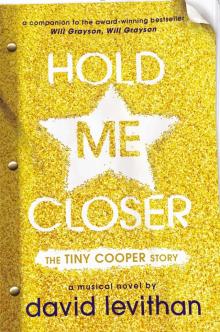 Hold Me Closer: The Tiny Cooper Story
Hold Me Closer: The Tiny Cooper Story The Full Spectrum
The Full Spectrum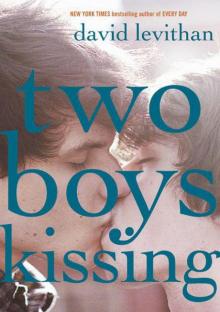 Two Boys Kissing
Two Boys Kissing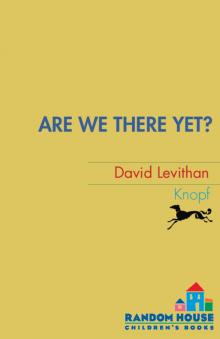 Are We There Yet?
Are We There Yet?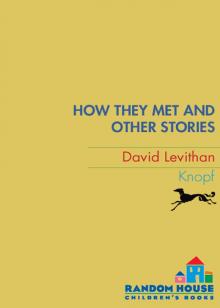 How They Met and Other Stories
How They Met and Other Stories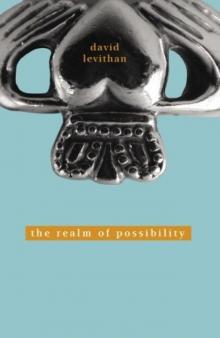 The Realm of Possibility
The Realm of Possibility Love Is the Higher Law
Love Is the Higher Law 19 Love Songs
19 Love Songs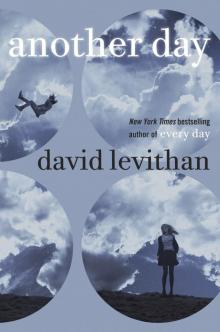 Another Day
Another Day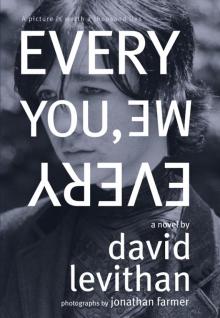 Every You, Every Me
Every You, Every Me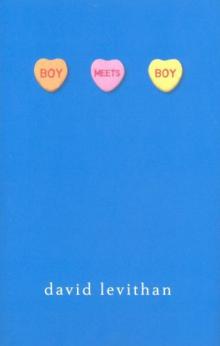 Boy Meets Boy
Boy Meets Boy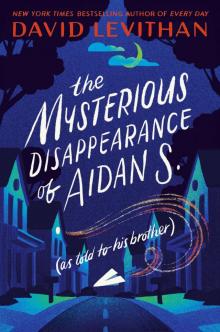 The Mysterious Disappearance of Aidan S. (as told to his brother)
The Mysterious Disappearance of Aidan S. (as told to his brother)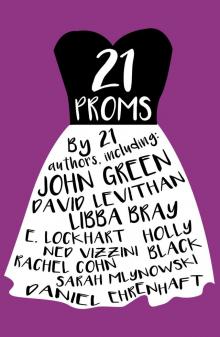 21 Proms
21 Proms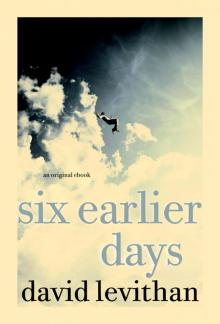 Six Earlier Days
Six Earlier Days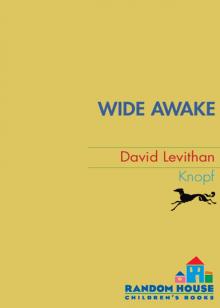 Wide Awake
Wide Awake Take Me With You When You Go
Take Me With You When You Go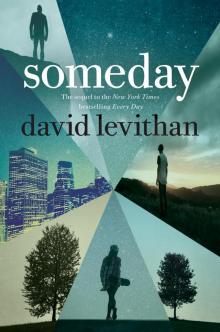 Someday
Someday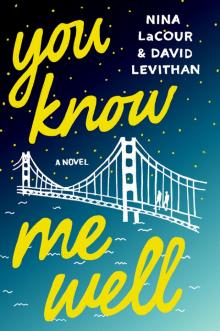 You Know Me Well
You Know Me Well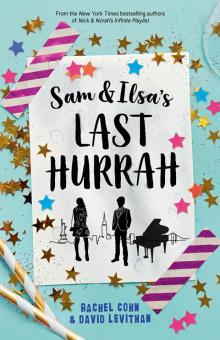 Sam and Ilsa's Last Hurrah
Sam and Ilsa's Last Hurrah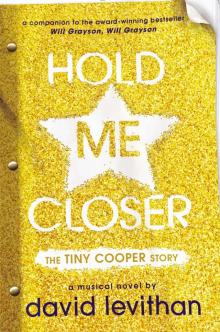 Hold Me Closer
Hold Me Closer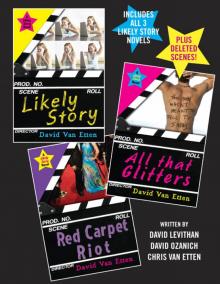 Likely Story!
Likely Story!